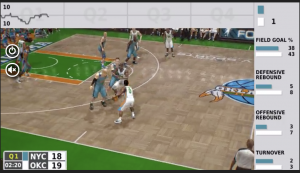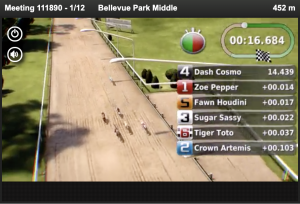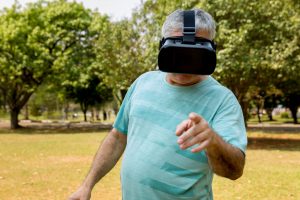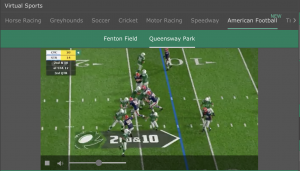Over the last few months we have seen a number of exciting new Virtual Sports offerings hit online sports betting sites and similar. We have seen updated versions of Virtual Greyhounds and Horse Racing, as well as brand new Virtual Sports games featuring sports as diverse as Darts, Basketball, Cricket and American Football.
hit online sports betting sites and similar. We have seen updated versions of Virtual Greyhounds and Horse Racing, as well as brand new Virtual Sports games featuring sports as diverse as Darts, Basketball, Cricket and American Football.
Add to that a number of next generation games that give added context to some Virtual Sports, such as 10Bet’s version of Virtual Football which replicates an entire season and generates data and statistics which players can use to help inform their bets, and it is easy to see why many people feel we are now set to move fully into the next generation of Virtual Sports games.
But with that in mind, one question we have to ask ourselves is just how far can Virtual Sports go in their seemingly relentless quest to replicate real life sports? Will we ever reach the situation where a Virtual Sport is virtually indistinguishable from the real life alternative? Will we see Virtual Sports offering as many different betting markets as you can get on a real-world game?
Or will Virtual Sports always have limitations imposed on it, simply due to the fact that it is not a real sport?
Future Applications of Virtual Sports
- Simulations
Earlier on this year, ITV Racing showcased just what Virtual Sports could be capable of in  their coverage of the Grand National horse race at Aintree in April. Prior to the real race, the TV company had partnered with a Virtual Sports company to help produce two ‘virtual’ Grand National races.
their coverage of the Grand National horse race at Aintree in April. Prior to the real race, the TV company had partnered with a Virtual Sports company to help produce two ‘virtual’ Grand National races.
The first of these was a “best of the best” Grand National, which pitted the greatest winners of the race over a huge period of time against each other to decide which horse was the best of all the winners (a race which was won by Red Rum).
The second was a direct simulation of the race that was forthcoming the following day (and in the year before when ITV Racing did this, the simulation had the same winner as the real race which followed on from it).
What was special about this simulation was that it was a faithful re-enactment of the race in full and used cutting edge graphics to render the race as lifelike as possible. Indeed, had you not been told it was a Virtual Race beforehand, you would have been forgiven for thinking it was the real thing.
This small demonstration showed you a potential future use of Virtual Sports technology in that it could be used to ‘sim’ a real life event, or provide you with a way to decide who is the best of the best, from teams or individuals that operated across different eras/
This could be rolled out across different sports. For example, who would win in a game between the Brazil 1970 World Cup Winning team and the Spanish World Cup winning team of 2010? In real life, we could never find this out but in Virtual Sports, if you could set up two teams to represent each of the competitors in the game it would be possible.
The permutations for sports and events you could do are limitless and would offer a brand new way for Virtual Sports to attract punters, many of whom have a long-standing interest in the game and who will often debate who was the best boxer, the best football or rugby team, or who was the fastest F1 driver.
Virtual Sports technology could be used to settle these arguments once and for all, as well as providing an opportunity to bet on the events as if they were happening in real time.
- Augmented Reality
I can see Virtual Sports also starting to look at how it can utilise augmented reality into its  products to make them look like they are set in real life arenas, stadia and similar. Augmented reality combines elements of the real world (usually through a smartphone camera or similar) with virtual reality to produce an image that combines the two.
products to make them look like they are set in real life arenas, stadia and similar. Augmented reality combines elements of the real world (usually through a smartphone camera or similar) with virtual reality to produce an image that combines the two.
It was very popularly used on the Pokemon Go craze a few years ago, where people visited real life locations to collect Pokemon in the game. However, it would not be too difficult to imagine that similar technology could be used to super-impose virtual sports games over a real life stadium or similar.
- Personalisation
I think another potential area ripe for development in Virtual Sports is the opportunity to allow punters to personalise their Virtual Sports game as they see fit. It is worth remembering that in Virtual Sports, team names, players and whatnot are simply generated randomly from a pool.
In future, I see players being able to edit, say the competitors taking part in a race, or perhaps the name of football teams, to help personalise their Virtual Sports betting experience. You could even allow customers to handicap their own game, with the odds adjusting as suited on the different bets.
The random element of esports would still mean that these games cannot be predicted uniformly and so would remain open for betting, but by allowing players to personalise their experience in Virtual Sports, you add a huge degree of appeal to games.
You could even allow players to use Virtual Sports as a prediction tool to help them try and predict the outcome of a sporting event, especially if they can personalise the teams or individuals competing in it to reflect real life.
- Continued Improvement & Addition of New Sports
I think in the shorter term, Virtual Sports future may be a little less far-reaching than some of the ideas outlined above. I can see a number of other sports becoming popular Virtual Sports offerings. We already know that there are a number of Virtual Sports games in the pipeline and I can see the number of sports being offered increasing over the next few years.
of the ideas outlined above. I can see a number of other sports becoming popular Virtual Sports offerings. We already know that there are a number of Virtual Sports games in the pipeline and I can see the number of sports being offered increasing over the next few years.
Similarly, the number of bets available on each Virtual Sport will also likely increase as the technology improves and is more robust. I also feel that graphically, the use of motion-capture technology will produce more realistic and life-like Virtual Sports to enjoy.
One thing is sure, Virtual Sports has a bright future and we are only seeing the beginning of how it can be applied within the sports betting industry.
